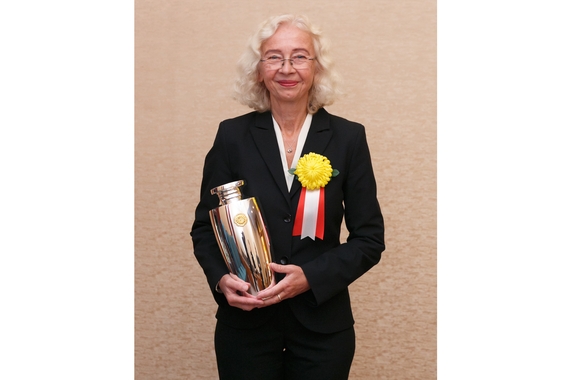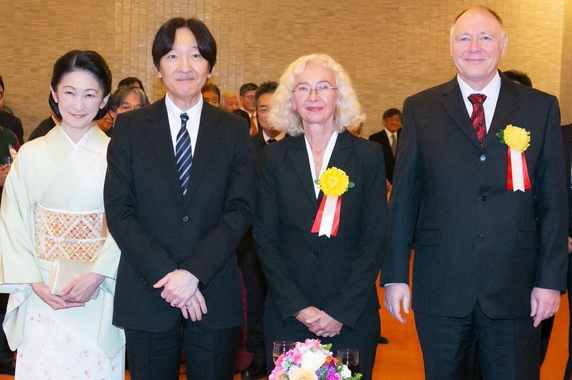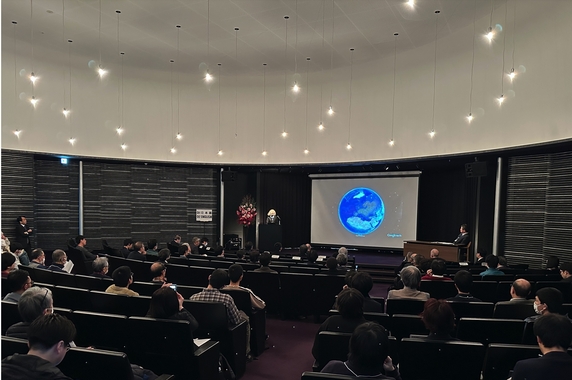International Prize for biology
Past Recipients/Presentation Ceremony2024 Presentation Ceremony, Acceptance Address, Selection Process, Commemorative Symposium
Presentation Ceremony
for the 2024 International Prize for Biology was held
in the presence of Their Imperial Highnesses the Crown Prince and Crown Princess Akishino on December 17, 2024
for the 2024 International Prize for Biology was held
in the presence of Their Imperial Highnesses the Crown Prince and Crown Princess Akishino on December 17, 2024
40th Prize Recipient
Dr. Angelika Brandt, Professor, Senckenberg Research Institute and Natural History Museum Frankfurt /Professor, Goethe University Frankfurt, Germany
Dr. Angelika Brandt, Professor, Senckenberg Research Institute and Natural History Museum Frankfurt /Professor, Goethe University Frankfurt, Germany

In the presence of Their Imperial Highnesses Crown Prince and Crown Princess Akishino, Dr. Angelika Brandt delivering her acceptance address.
On December 17, 2024, the presentation ceremony for the 2024 International Prize for Biology was held at The Japan Academy in the presence of Their Imperial Highnesses the Crown Prince and Crown Princess Akishino, Mr. TSUJI Kiyoto, State Minister of Cabinet Office, and Mr. NONAKA Atsushi, State Minister of Education, Culture, Sports, Science and Technology (MEXT).
At the ceremony, Dr. Brandt was presented the Prize of 10-million yen and a medal by Dr. FUJIYOSHI Yoshinori, Chair of the International Prize for Biology Committee, along with an Imperial gift from the Crown Prince Akishino.
Following an address offered by the Crown Prince Akishino, congratulatory messages were delivered by Prime Minister ISHIBA Shigeru (read by Mr. TSUJI) and MEXT Minister Dr. ABE Toshiko (read by Mr. NONAKA) . The ceremony concluded with an acceptance address from Dr. Brandt.
After the ceremony, a reception to honor the Prize recipient was held in the presence of the Crown Prince and Princess Akishino.
At the ceremony, Dr. Brandt was presented the Prize of 10-million yen and a medal by Dr. FUJIYOSHI Yoshinori, Chair of the International Prize for Biology Committee, along with an Imperial gift from the Crown Prince Akishino.
Following an address offered by the Crown Prince Akishino, congratulatory messages were delivered by Prime Minister ISHIBA Shigeru (read by Mr. TSUJI) and MEXT Minister Dr. ABE Toshiko (read by Mr. NONAKA) . The ceremony concluded with an acceptance address from Dr. Brandt.
After the ceremony, a reception to honor the Prize recipient was held in the presence of the Crown Prince and Princess Akishino.

Dr.Brandt holding the Imperial gift

Reception
Your Imperial Highnesses, your Excellencies, ladies and gentlemen!
Today’s participation of your Imperial Highnesses Crown Prince and Crown Princess Akishino shows the outstanding dedication of the Imperial Household and the Japanese Research Community to marine biology, I am therefore also very grateful to your father and predecessor. I thank you personally, on behalf of my colleagues and all scientists, for your support, and for your leadership.
I am humbled to receive this world’s premier recognition of Systematic Biology and Taxonomy for my achievements in a group of world-class scientists being awarded through your rigorous nomination and review process of the Japan Society for the Promotion of Science. Thank you all, the members of the Committee, the Selection Committee, and the Secretariat very much, indeed!
I am very glad to receive this Prize for systematics and taxonomy and to be able to work in the footsteps of the Emperor Showa and His Majesty the Emperor Emeritus having worked on cnidarians and in ichthyology respectively.
I have repeatedly asked myself over the last few weeks why I got the Prize when I am only one among so many scientists. As a marine zoologist, I have been canalized by many projects and through very good students and scientists I worked with. Therefore, I have to share the honour with my working groups as well as all my colleagues nationally and internationally who worked with me either at sea during the expeditions I organized, like my ANDEEP, KuramBio or AleutBio “ibasho” or when I was invited for expeditions like from AORI here in Tokyo to join an expedition with RV Hakuho Maru. Without all of you, your friendship, collaboration and support as well as the boundless support, trust and love of my husband I would not be here today.
Based on extensive international cooperation and many expeditions I designed the ANDEEP (Antarctic benthic DEEP-sea biodiversity: colonisation history and recent community patterns) expeditions to the Southern Ocean deep sea, which yielded a wealth of new species and an unexpectedly high biodiversity of this area. During these and later expeditions with RVs Polarstern, James Clarke Ross, Sonne, Akademic M.A. Lavrentjev, Meteor and Hakuho Maru I have worked with many scientists from all over the world. Our research involved several generations, and encompassed many distinct cultures, and it was most inspiring and important to have students around whom I have not only taught, I also have learned a lot from them; and maybe, one of the happiest parts of my experiences in research is that ever since the Meiji Period and early days of the University of Tokyo, research contributes to bringing people together.
Species are the basis of any biological research, their health and well-being, their evolution or biogeography, their communities, all of these millions of species described are currently under threat by us through climate change and other anthropogenically induced pressures. It is therefore important to name, study and conserve them, continue the work in taxonomy and systematics and teach young students. I am deeply honoured and grateful for the recognition of our work in systematics and taxonomy and the support that it gives to this discipline internationally.
If the late Professor Klausewitz, a capacity in ichthyology from Senckenberg, would still be with us, I am sure he would be more than pleased to join todays’ celebration, since he was involved in the research of His Majesty, the Emperor Emeritus, on gobioid fishes.
The International Prize for Biology inspires all of us to continue to learn more about the species, their distribution, ecology and evolution in the deep sea and anywhere in the world and helps us keep our planet a habitable and beautiful place. We were stunned when the astronauts revealed in 1969 the beauty of our planet seen from space. The writer Sir Arthur C. Clarke was the first to notice how wrong it was to call this planet Earth when, clearly, it is Ocean. Despite being so many years ago, this discovery that we live on a planet misnamed “Earth” is only just beginning to penetrate public awareness. How can it be that we know more about the surface of planet Mars and its atmosphere, than we know about the deep sea of planet “Ocean” and the species living there?
We hope that new discoveries of species in the ocean as well as their conservation will help to shape a sustainable future of marine life and, accordingly, for all of us.
Thank you. Hontoni arigato gozaimasu.
Today’s participation of your Imperial Highnesses Crown Prince and Crown Princess Akishino shows the outstanding dedication of the Imperial Household and the Japanese Research Community to marine biology, I am therefore also very grateful to your father and predecessor. I thank you personally, on behalf of my colleagues and all scientists, for your support, and for your leadership.
I am humbled to receive this world’s premier recognition of Systematic Biology and Taxonomy for my achievements in a group of world-class scientists being awarded through your rigorous nomination and review process of the Japan Society for the Promotion of Science. Thank you all, the members of the Committee, the Selection Committee, and the Secretariat very much, indeed!
I am very glad to receive this Prize for systematics and taxonomy and to be able to work in the footsteps of the Emperor Showa and His Majesty the Emperor Emeritus having worked on cnidarians and in ichthyology respectively.
I have repeatedly asked myself over the last few weeks why I got the Prize when I am only one among so many scientists. As a marine zoologist, I have been canalized by many projects and through very good students and scientists I worked with. Therefore, I have to share the honour with my working groups as well as all my colleagues nationally and internationally who worked with me either at sea during the expeditions I organized, like my ANDEEP, KuramBio or AleutBio “ibasho” or when I was invited for expeditions like from AORI here in Tokyo to join an expedition with RV Hakuho Maru. Without all of you, your friendship, collaboration and support as well as the boundless support, trust and love of my husband I would not be here today.
Based on extensive international cooperation and many expeditions I designed the ANDEEP (Antarctic benthic DEEP-sea biodiversity: colonisation history and recent community patterns) expeditions to the Southern Ocean deep sea, which yielded a wealth of new species and an unexpectedly high biodiversity of this area. During these and later expeditions with RVs Polarstern, James Clarke Ross, Sonne, Akademic M.A. Lavrentjev, Meteor and Hakuho Maru I have worked with many scientists from all over the world. Our research involved several generations, and encompassed many distinct cultures, and it was most inspiring and important to have students around whom I have not only taught, I also have learned a lot from them; and maybe, one of the happiest parts of my experiences in research is that ever since the Meiji Period and early days of the University of Tokyo, research contributes to bringing people together.
Species are the basis of any biological research, their health and well-being, their evolution or biogeography, their communities, all of these millions of species described are currently under threat by us through climate change and other anthropogenically induced pressures. It is therefore important to name, study and conserve them, continue the work in taxonomy and systematics and teach young students. I am deeply honoured and grateful for the recognition of our work in systematics and taxonomy and the support that it gives to this discipline internationally.
If the late Professor Klausewitz, a capacity in ichthyology from Senckenberg, would still be with us, I am sure he would be more than pleased to join todays’ celebration, since he was involved in the research of His Majesty, the Emperor Emeritus, on gobioid fishes.
The International Prize for Biology inspires all of us to continue to learn more about the species, their distribution, ecology and evolution in the deep sea and anywhere in the world and helps us keep our planet a habitable and beautiful place. We were stunned when the astronauts revealed in 1969 the beauty of our planet seen from space. The writer Sir Arthur C. Clarke was the first to notice how wrong it was to call this planet Earth when, clearly, it is Ocean. Despite being so many years ago, this discovery that we live on a planet misnamed “Earth” is only just beginning to penetrate public awareness. How can it be that we know more about the surface of planet Mars and its atmosphere, than we know about the deep sea of planet “Ocean” and the species living there?
We hope that new discoveries of species in the ocean as well as their conservation will help to shape a sustainable future of marine life and, accordingly, for all of us.
Thank you. Hontoni arigato gozaimasu.
On behalf of the Selection Committee for the 40th International Prize for Biology, it gives me great pleasure to report on this year’s selection process.
The Selection Committee comprised 20 members, including four researchers from overseas.
This year’s field of specialization for the Prize was "Systematic Biology and Taxonomy." To obtain recommendations of suitable candidates, the Committee distributed a total of 1,637 recommendation forms to Japanese and overseas universities, research centers, academic associations, international academic organizations, and other institutions. In response, a total of 67 recommendations were received. After excluding recommendations for the same individuals, the number of persons recommended was 54 from 20 countries and regions.
The Selection Committee met a total of five times. After carefully reviewing all the candidates, the Committee recommended Professor Angelika Brandt to the Prize Committee as the recipient of the 40th International Prize for Biology.
After obtaining her doctorate at the University of Oldenburg in Germany, Professor Brandt continued her research at Kiel University. She currently conducts research and education activities at the Senckenberg Research Institute and Natural History Museum Frankfurt and at Goethe University Frankfurt.
Professor Brandt has planned and carried out many international research projects and marine expeditions, significantly broadening the scope of research in fields of systematics, taxonomy, and ecology. Among Professor Brandt’s most notable achievements was a deep-sea biological survey that she led in the Southern Ocean. It involved the participation of more than 50 researchers from 13 countries. From materials obtained from this and other expeditions, she discovered and named new taxonomic groups and proposed a new classification system for Isopoda. She has also promoted the digitalization of data on the taxonomy of deep-sea species.
The selection criteria for this Prize focuses on the relevance of the candidate’s research to the selected field of biology, its originality, its influence on that field of biology, and its contribution to advancing biological science as a whole. Professor Brandt’s work and achievements more than amply satisfied all these selection criteria.
Based on our recommendation, the Committee on the International Prize for Biology deliberated and decided to award the 40th International Prize for Biology to Professor Angelika Brandt.
With this, I conclude my report on the process of the Prize selection.
The Selection Committee comprised 20 members, including four researchers from overseas.
This year’s field of specialization for the Prize was "Systematic Biology and Taxonomy." To obtain recommendations of suitable candidates, the Committee distributed a total of 1,637 recommendation forms to Japanese and overseas universities, research centers, academic associations, international academic organizations, and other institutions. In response, a total of 67 recommendations were received. After excluding recommendations for the same individuals, the number of persons recommended was 54 from 20 countries and regions.
The Selection Committee met a total of five times. After carefully reviewing all the candidates, the Committee recommended Professor Angelika Brandt to the Prize Committee as the recipient of the 40th International Prize for Biology.
After obtaining her doctorate at the University of Oldenburg in Germany, Professor Brandt continued her research at Kiel University. She currently conducts research and education activities at the Senckenberg Research Institute and Natural History Museum Frankfurt and at Goethe University Frankfurt.
Professor Brandt has planned and carried out many international research projects and marine expeditions, significantly broadening the scope of research in fields of systematics, taxonomy, and ecology. Among Professor Brandt’s most notable achievements was a deep-sea biological survey that she led in the Southern Ocean. It involved the participation of more than 50 researchers from 13 countries. From materials obtained from this and other expeditions, she discovered and named new taxonomic groups and proposed a new classification system for Isopoda. She has also promoted the digitalization of data on the taxonomy of deep-sea species.
The selection criteria for this Prize focuses on the relevance of the candidate’s research to the selected field of biology, its originality, its influence on that field of biology, and its contribution to advancing biological science as a whole. Professor Brandt’s work and achievements more than amply satisfied all these selection criteria.
Based on our recommendation, the Committee on the International Prize for Biology deliberated and decided to award the 40th International Prize for Biology to Professor Angelika Brandt.
With this, I conclude my report on the process of the Prize selection.
To mark the award to Dr.Brandt, a Commemorative Symposium for the 40th International Prize for Biology, "Phylogeny and Taxonomy - World of the diversified organisms including plants,animals, fungi, algae and microbes" was held on December 21, 2024 in Kyoto, co-organized by Kyoto University and the Japan Society for the Promotion of Science.

Lecture by Dr.Brandt

Symposium at Kyoto University
